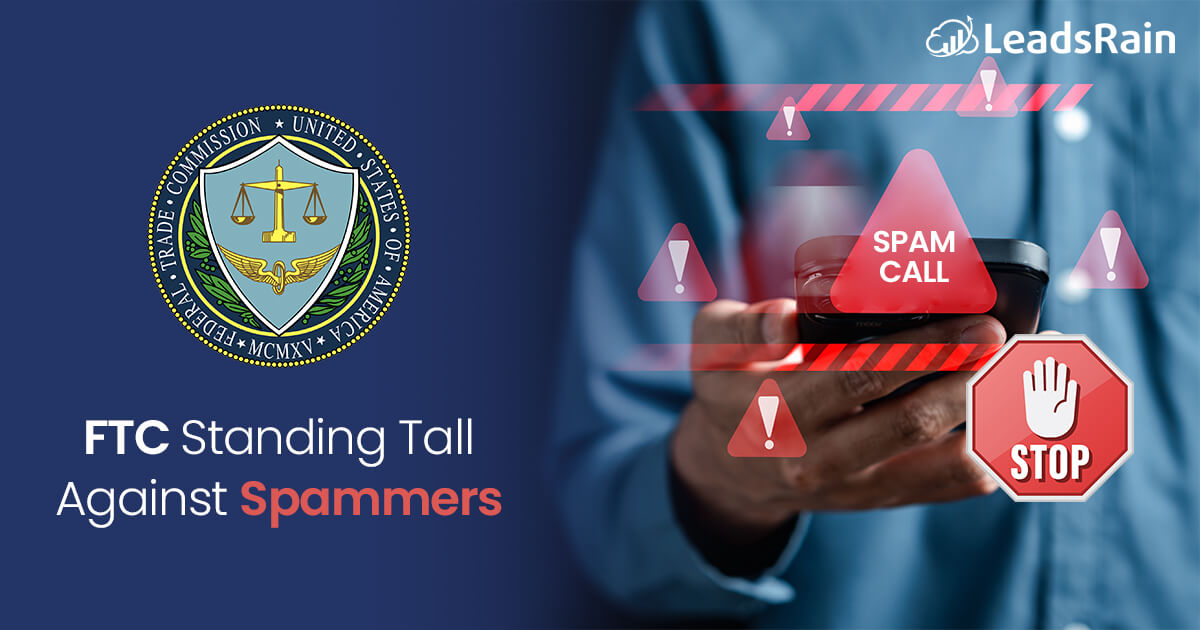Spam calls have grown to be a major annoyance for people everywhere. Our daily routines are disturbed, our privacy is invaded, and our time is wasted. The FTC actively investigates and takes legal actions against illegal telemarketing operations involved in spam calls. The Federal Trade Commission (FTC) has been actively battling these annoying and unlawful practices. The FTC strives to create a spam-free future where consumers can answer their phones without fear of scams or unwanted solicitations.
Role of FTC in Controlling Call Centre Wrong Practices
You might picture a call center as a busy office with customer service agents working diligently to assist callers. The FTC plays a fundamental role in safeguarding consumers from call center wrong practices. Thus, FTC steps up to the plate to protect consumers and ensure fair business practices.
Let’s walk through these 10 roles played by the FTC in controlling call center wrong practices.
Regulation creation and enforcement
The FTC establishes rules and regulations that call centers must follow. By inspecting call centers and levying penalties for non-compliance, they enforce these regulations.
Consumer protection from robocalls and violations of the do-not-call registry
The FTC is essential in combating the pervasive problem of robocalls and violations of the do-not-call registry. They work towards implementing strict measures to curb these intrusive practices.
Educating the public about scams and fraudulent call centers
The Federal Trade Commission (FTC) collaborates closely with other regulatory bodies, such as the Federal Communications Commission (FCC), to pool resources and effectively combat unethical call center practices.
Advocating for stronger consumer protection laws
FTC actively works to improve state and federal consumer protection laws. Their suggestions and opinions have an impact on the legislation that shields people from unethical call center practices.
Prosecuting call centers engaging in illegal activities
FTC takes legal action against call centers involved in illegal activities like deceptive telemarketing and fraudulent practices. To hold these organizations responsible, they impose steep fines and penalties.
Industry reputation management
By actively monitoring call centers and taking swift action against wrong practices, the FTC plays a key role in maintaining the overall reputation of the call center industry. This builds trust among consumers, who can confidently engage with call centers without fear of falling victim to scams or deceptive practices.
Complaint resolution
The FTC acts as a mediator between consumers and call centers, effectively resolving complaints and disputes. Through this process, the commission aims to restore consumer confidence and rectify any wrongdoings in the call center industry.
Policy development
The FTC constantly reviews its policies and guidelines to stay ahead of evolving trends in the call center industry. This proactive approach allows it to adapt its strategies and enforcement mechanisms to address emerging issues effectively.
Consumer awareness
The FTC plays a crucial role in educating consumers about their rights and informing them about potential scams or fraudulent activities in the call center industry. Such initiatives aim to empower consumers and promote informed decision-making.
Enforcing compliance
One of the primary roles of the FTC is to enforce compliance with existing laws and regulations. The commission actively monitors call centers to ensure they adhere to fair business practices, protecting consumers from unethical behavior.
New Policies and Regulations By FTC to Identify and Control Spammer Call Center
The increasing prevalence of spam calls has become a nuisance for many people across the world. By imposing strict penalties and levying fines, the FTC aims to deter these unlawful activities and protect consumers from scams and fraudulent schemes.
In September 2021, the Federal Trade Commission (FTC) had implemented various regulations and initiatives to combat spammer call centers. However, please note that there may have been updates or new regulations introduced since then. Here are some recent regulations and initiatives introduced by the FTC:
The TRACED Act
The TRACED Act, which stands for Telephone Robocall Abuse Criminal Enforcement and Deterrence Act, was signed into law in December 2019. It provides the FTC and other agencies with enhanced tools and authority to combat illegal robocalls.
Key provisions of the TRACED Act include:
- Increased Penalties: The Act increases the penalties for illegal robocallers, allowing the FTC to seek fines of up to $10,000 per call.
- Statute of Limitations Extension: The TRACED Act extends the statute of limitations for prosecuting illegal robocallers from one to three years, giving law enforcement agencies more time to pursue legal action.
- Call Authentication: The Act mandates voice service providers to adopt call authentication technologies, known as the STIR/SHAKEN framework. This technology verifies the authenticity of caller ID information, making it harder for spammers to spoof phone numbers.
Implementing the STIR/SHAKEN Framework
The STIR/SHAKEN framework (Secure Telephone Identity Revisited/Signature-based Handling of Asserted Information Using Tokens) is an industry standard for call authentication. It works by digitally signing calls to verify their authenticity. When a call is made, the signing service generates a digital signature that can be validated by the recipient’s service provider. If the signature is valid, it indicates that the call is from the legitimate caller.
The FTC has been actively encouraging voice service providers to adopt and implement the STIR/SHAKEN framework. By implementing this technology, providers can help combat spoofing and fraudulent caller ID information, making it easier for consumers to trust the authenticity of incoming calls.
Robocall Data Analytics Challenge
In an effort to leverage data analytics to combat illegal robocalls, the FTC organized the Robocall Data Analytics Challenge. This challenge aimed to incentivize the development of innovative solutions that use data analysis techniques to identify patterns and devise effective strategies against robocallers.
Participants in the challenge were tasked with developing algorithms and models that could analyze large volumes of call data to detect and predict robocall patterns accurately. The FTC offered cash prizes to the winners to encourage the development of effective robocall mitigation strategies.
Public and Private Partnerships
The FTC recognizes the importance of collaboration and partnerships in the fight against illegal robocalls. It actively works with federal, state, and international law enforcement agencies, as well as industry stakeholders, to share information, coordinate enforcement efforts, and develop technological solutions.
These partnerships allow for better cooperation and coordination, facilitating the identification and shutdown of illegal call centers. By joining forces, public and private entities can pool resources, expertise, and technologies to tackle the issue of illegal robocalls more effectively.
Consumer Education and Reporting
Consumer education is a crucial aspect of the FTC’s strategy to combat illegal robocalls. The FTC provides resources and guidance to educate consumers about robocall scams, their risks, and how to protect themselves. This includes raising awareness about call-blocking tools and encouraging consumers to report unwanted and illegal calls.
Through the National Do Not Call Registry and the FTC’s Complaint Assistant, consumers can register their phone numbers to reduce telemarketing calls and report instances of illegal robocalls. Reporting helps the FTC gather data, identify patterns, and take appropriate action against violators.
Robocall Mitigation Efforts
The FTC, in collaboration with the Federal Communications Commission (FCC), has been actively working to mitigate robocalls. These efforts include encouraging the development and implementation of call authentication technologies like STIR/SHAKEN, which verify the authenticity of caller ID information. The FCC has also granted additional authority to telecom carriers to block illegal and unwanted robocalls.
By empowering consumers with knowledge and encouraging their active participation in reporting illegal calls, the FTC aims to create a more robust defense against spammer call centers.
It’s important to stay updated on the latest developments regarding regulations and initiatives by visiting the FTC’s official website and referring to reliable legal sources for the most current
Conclusion
Thus, recognizing the importance of technology in combating spam calls, the FTC has encouraged the development and implementation of call-blocking solutions. These technologies such as call-filtering apps,etc. Help individuals reduce the number of unwanted calls they receive. With investments in advanced AI solutions and strict enforcement in legal measures, we can hope for a future with fewer spam calls and a better user experience for all.




